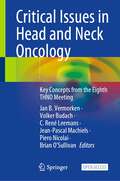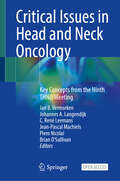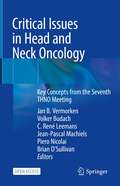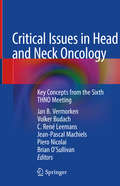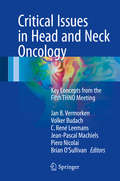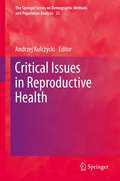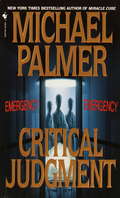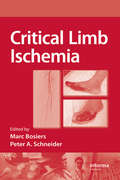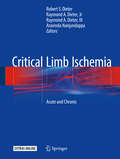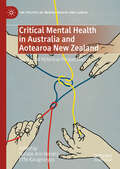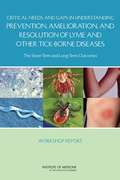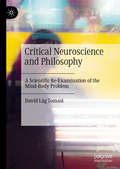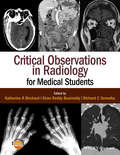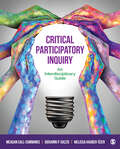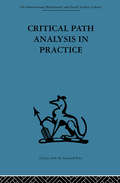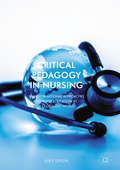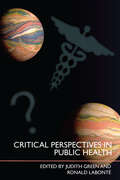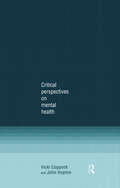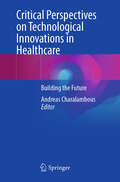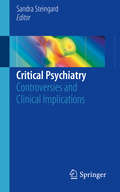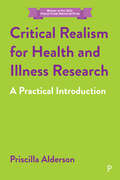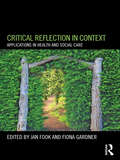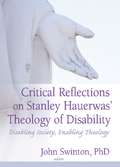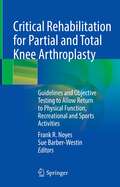- Table View
- List View
Critical Issues in Head and Neck Oncology: Key Concepts from the Eighth THNO Meeting
by Jan B. Vermorken Volker Budach C. René Leemans Jean-Pascal Machiels Piero Nicolai Brian O’SullivanThis is an open access book.With a wealth of exciting data emerging in this rapidly evolving field this book will review the state-of-the-art knowledge with emphasis on multidisciplinary decision and management of head and neck cancer. The book provides significant detail on a wide range of topics including: the role of new targets for treatment, immunotherapy, resistance mechanisms, standardizing molecular profiling programs, and new methods to guide therapeutic approaches. In addition different disease situations are addressed including different treatment approaches in primary disease and in recurrent and/or metastatic disease as well as new developments in pathology, surgery and reconstruction techniques, new systemic therapies in salivary gland cancer, and supportive care and follow-up.All disciplines involved in the treatment of head & neck cancer are covered with a focus on translation into daily practice. The 8th-THNO is designed for medical oncologists, head and neck surgeons, radiation oncologists, otolaryngologists, and other medical professionals involved in the treatment of patients with head and neck cancer.
Critical Issues in Head and Neck Oncology: Key Concepts from the Ninth THNO Meeting
by Jan B. Vermorken C. René Leemans Jean-Pascal Machiels Piero Nicolai Brian O’Sullivan Johannes A. LangendijkThis is an open access book. With a wealth of exciting data emerging in this rapidly evolving field, this book reviews state-of-the-art knowledge with emphasis on multidisciplinary decision making and management of head and neck cancer. Significant detail is provided on a wide range of topics including: oral potentially malignant disorders, cell-based assays for drug discovery and drug evaluation, the role of precision medicine (genomics and beyond), innovations in systemic therapy (including metronomic chemotherapy and immunotherapy), surgery (including partial laryngeal surgery and quality of reconstruction) and radiotherapy (including FLASH-therapy) in different disease settings taking into account their impact on benefit/risk ratio. In addition, specific topics such as hypoxia, hyperthermia, intratumoral drug administration, noninvasive biomarkers, local therapy in metastatic head and neck cancer, sentinel lymph node biopsy in cN0 early-stage oral cavity cancer, prognostic factors in HPV-positive oropharyngeal cancer, molecular characterization of salivary gland cancer (including implications for treatment) and strategies to improve outcome in salivary duct carcinoma are discussed. All disciplines involved in the treatment of head and neck cancer are covered with a focus on translation into daily practice. The 9th-THNO is designed for medical oncologists, head and neck surgeons, radiation oncologists, otolaryngologists, and other medical professionals involved in the treatment and care of patients with head and neck cancer.
Critical Issues in Head and Neck Oncology: Key Concepts from the Seventh THNO Meeting
by Jan B. Vermorken Volker Budach C. René Leemans Jean-Pascal Machiels Piero Nicolai Brian O’SullivanThis open access book discusses the most current issues in head and neck cancer with a focus on current trends such as biomarkers, precision medicine and immunotherapy. New approaches in the diagnosis such as liquid biopsies and imaging biomarkers to predict radiotherapy toxicity as well as approaches in the surgical management of head and neck cancers are discussed. The book discusses medical and surgical approaches in both primary, recurrent and metastatic disease and also covers approaches for rare head neck cancers. Readers will learn about the latest drug developments and epidemiological aspects in cancers ranging from Head and Neck Squamous Cell Cancer to Nasopharynx cancer.Edited by a team of world leaders in Head and Neck Cancer, this volume serves as an easy reference to the head and neck oncology practitioner and provides a contemporary overview for specialists the field. The chapters are based on the latest data presented at the 7th Trends in Head and Neck Oncology Conference and reflect the most up-to-date information in the field.
Critical Issues in Head and Neck Oncology: Key Concepts from the Sixth THNO Meeting
by Brian O'Sullivan Jan B. Vermorken Volker Budach C. René Leemans Jean-Pascal Machiels Piero NicolaiThis book provides an overview of the latest advances in head and neck cancer using a multidisciplinary approach. Commencing with a discussion of epidemiological and diagnostic aspects, including the role of vaccination and key pathological features, the book then follows by examining the role of oncogenomics, proteomics, next generation sequencing and homologous recombination function in predicting outcomes. The topics are presented by epidemiologists, pathologists and basic scientists with further contributions from medical oncologists, head and neck cancer surgical specialists (ORL /HNS), and radiation oncologists in chapters that discuss therapeutic approaches for oral, oropharyngeal and thyroid cancer. Special topics such as the development of novel staging classifications, optimal larynx preservation approaches for laryngeal and hypopharyngeal cancer, surgical reconstruction, new surgical approaches in oropharynx cancer, potential for treatment de-escalation, systemic therapy in nasopharyngeal cancer and salivary gland tumors and treatment approaches for tumors of unknown primary site are discussed in detail. Finally, the role of immunotherapy in the field is highlighted. The chapters are based on the latest data presented at the 6th Trends in Head and Neck Oncology Conference and reflect the most up-to-date information in the field. They are written by many of the most internationally acclaimed authors in the field and are therefore an excellent source for all those interested or actively working in the field of head and neck cancer.
Critical Issues in Head and Neck Oncology: Key concepts from the Fifth THNO Meeting
by Brian O'Sullivan Jan B. Vermorken Volker Budach C. René Leemans Jean-Pascal Machiels Piero NicolaiThis book offers a selection of the critical current issues and challenges in head and neck cancer. It covers most key concepts of the subject, from diagnostic challenges to multidisciplinary decision-making aspects in head and neck oncology. Starting with the Make Sense Campaign and examining its impact on clinical practice, readers also gain insight into current and novel therapeutic approaches, including radiotherapy, cytotoxic chemotherapy, targeted therapy, and immunotherapy, as well as the importance of adequate supportive care. Surgical interventions such as endoscopic surgery, salvage surgery, dentistry and implants are also discussed. Moreover, the changing respective roles of the involved caregivers are highlighted and extensively discussed. The chapters are based on the latest data presented at the 5th Trends in Head and Neck Oncology Conference and reflect the most up-to-date information in the field. Taking into account the ample current treatment options for patients with head and neck cancer and discussing side effects, survivorship issues and treatment in the elderly, this book provides and up-to-date coverage of all the critical topics in the field. Highlighting the increasing importance of decision-making in recurrent and metastatic head and neck cancer as well as quality of life and end of life issues, this reference book also emphasizes a multidisciplinary approach that plays such an important role in the outcome for this disease. Edited by a team of world leaders in Head and Neck Cancer this volume serves as an easy reference to the head and neck oncology practitioner and provides an up-to-date overview for specialists the field.
Critical Issues in Reproductive Health (The Springer Series on Demographic Methods and Population Analysis #33)
by Andrzej KulczyckiIn this book, leading academics and practitioners in the field of reproductive health address topics such as contraception, abortion, sexually transmitted infections, maternal and prenatal health, sexuality and reproductive rights by examining a number of critical issues in these areas. The authors describe new research, identify gaps and priorities in policy and practice, and illustrate innovative solutions. The book further addresses such current imperatives as understanding the social meanings of emergency contraception, measuring gender-based violence, improving reproductive health governance, strengthening health systems and services, and redressing institutional barriers. The book also assesses how reproductive health programs can be reconfigured to new challenges such as those posed by climate change, vulnerable youth in fragile states, and risks from new infertility treatments. Using a rich and varied set of cases, a broad public health and social science perspective, and novel methodological approaches, this book questions common assumptions, illustrates effective solutions and sets out research, policy, and programmatic agendas for the present and future. This is a comprehensive volume which provides a valuable resource to researchers, educators, practitioners, policymakers and students, as well as anyone studying or advocating for reproductive health.
Critical Judgment: A Novel
by Michael PalmerIn the tiny town of Patience, California, newcomer Dr. Abby Dolan has noticed a frightening syndrome among her emergency room patients. It begins with a baffling, seemingly minor set of symptoms, but builds relentlessly until it plunges its victims into insane, murderous rages. As she searches for clues to this deadly mystery, Abby's superiors make it clear her probing is unwelcome. Soon Abby will learn just how high the cost of the truth may be--and how far someone will go to keep a lethal secret. But she may not find the answer until it's too late to save her patients, her career. . . her life.
Critical Limb Ischemia
by Peter A. Schneider Marc BosiersCovering both noninvasive and surgical treatment alternatives, Critical Limb Ischemia defines practical guidelines for a multidisciplinary approach to critical limb ischemia and follows a step-by-step description of the latest techniques.Topics covered include:Balloon angioplasty and stenting Cryoplasty Pharmacotherapy Topical therapies combined wi
Critical Limb Ischemia: Acute and Chronic
by Aravinda Nanjundappa Robert S. Dieter Raymond A. DieterThis book provides a comprehensive overview of acute and chronic critical limb ischemia (CLI). Loss of an extremity, or a portion thereof, is not necessarily a life-ending process, but it is a debilitating experience whether involvement is of the upper or lower extremity. It reviews the epidemiology, pathophysiology, etiology, physical examination, imaging modalities, diagnosis, and treatment of limb ischemia. It investigates the most frequent as well as the more unusual etiological processes that may lead to the most dreaded concern of patients and families: amputation. The therapeutics of CLI has been significantly advanced through the multidisciplinary approach to the patient and disease, a focus that is explored in detail throughout the book. Surgical and endovascular treatment guidelines as well as medical therapy, wound healing, and long-term care are discussed. Featuring an extensive illustration program, Critical Limb Ischemia: Acute and Chronic, is a valuable resource for vascular and endovascular surgeons, vascular medicine specialists, interventional radiologists, and cardiologists.
Critical Mental Health in Australia and Aotearoa New Zealand: Social and Historical Perspectives (The Politics of Mental Health and Illness)
by Effie Karageorgos Natalie Ann HendryThis interdisciplinary volume examines the social production of mental health and illness in Australia and Aotearoa (New Zealand). It draws together cutting-edge critical mental health scholarship from the region, to interrogate how personal, community, institutional and mediated relations, make and remake experiences of ‘mental health.’ In the wake of the widespread insertion of psy-considerations into everyday lives, here contributors demonstrate how the relations between communities, practices, professionals and institutions often replicate long-standing histories of discrimination and violence motivated by psychiatric classification, even as the psy-disciplines move into supposedly more transformational domains: digital technology, schooling, human resources, and social media, for example. The book’s chapters reflect the current diversity within academic studies of mental health and illness in Australia and Aotearoa. This includes a wide range of case studies from war trauma in the Australian military and pornography addiction, to the depathologisation of trans health and peer workers in mental health services. Critical Mental Health in Australia and Aotearoa New Zealand offers unique insights particular to the region, to students and scholars of critical psychology, history, sociology, medical humanities, and education.
Critical Needs and Gaps in Understanding Prevention, Amelioration, and Resolution of Lyme and Other Tick-Borne Diseases: The Short-Term and Long-Term Outcomes - Workshop Report
by Institute of Medicine of the National AcademiesA single tick bite can have debilitating consequences. Lyme disease is the most common disease carried by ticks in the United States, and the number of those afflicted is growing steadily. If left untreated, the diseases carried by ticks--known as tick-borne diseases--can cause severe pain, fatigue, neurological problems, and other serious health problems. The Institute of Medicine held a workshop October 11-12, 2010, to examine the state of the science in Lyme disease and other tick-borne diseases.
Critical Neuroscience and Philosophy: A Scientific Re-Examination of the Mind-Body Problem
by David Låg TomasiThis book presents an analysis of the correlation between the mind and the body, a complex topic of study and discussion by scientists and philosophers. Drawing largely on neuroscience and philosophy, the author utilizes the scientific method and incorporates lessons learned from a vast array of sources. Based on the most recent cutting-edge scientific discoveries on the Mind-Body problem, Tomasi presents a full examination of multiple fields related to neuroscience. The volume offers a scientist-based and student-friendly journey into medicine, psychology, artificial intelligence, embodied cognition, and social, ecological and anthropological models of perception, to discover our truest self.
Critical Observations in Radiology for Medical Students
by Richard C. Semelka Kiran Reddy Busireddy Katherine R. BirchardCritical Observations in Radiology for Medical Students is an ideal companion for medical students and clinicians, with a focus on medical learning and patient management to support clerkship rotations and internship training. This brand new title delivers comprehensive radiological illustrations of various pathologies on different modalities, guiding the reader through the processes of understanding different imaging techniques, requesting the most appropriate medical imaging modality and procedure in order to reach a clinical diagnosis. With a simple approach to a wide-range of organ-based important pathologies from an imaging point of view, this comprehensively illustrated volume uses a simple consistent categorization scheme. This book includes: * In-depth evaluations of the strengths and weaknesses for each modality * Explanations of the basic physics of different imaging modalities * An accessible overview of the current FDA and ACR guidelines for imaging safety, radiation risks, with special guidelines for imaging children and pregnant women * An exploration of a wide-range of organ-based pathologies from an imaging point of view Critical Observations in Radiology for Medical Students is a timely, manageable and concise learning resource, with broad topic coverage and enhanced learning features to help students and clinicians answer the question, 'which test should I order?' and confidently diagnose and manage conditions.
Critical Participatory Inquiry: An Interdisciplinary Guide
by Meagan Call-Cummings Giovanni P. Dazzo Melissa Hauber-OzerCritical Participatory Inquiry: An Interdisciplinary Guide brings to life key principles of this collaborative research method for students, practitioners, and research collectives. The authors encourage readers to uncover new possibilities in research guided by the emancipatory roots of CPI to deconstruct inequitable conditions and practices. Weaving together theoretical perspectives, a variety of tools for data collection and analysis, and numerous practical examples, the authors offer a complete picture of the research process from start to finish. This thoughtful and thorough book prepares readers to co-create knowledge effectively and ethically. By addressing the underlying principles common to a variety of action and participatory research methods, readers learn to design and carry out research with, not on, communities. With examples from public health, social work, psychology, education, criminal justice, conflict resolution, and more, the text is suited to a wide variety of graduate-level courses and better reflects the interdisciplinary nature of participatory research with collectives of all sizes and compositions.
Critical Participatory Inquiry: An Interdisciplinary Guide
by Meagan Call-Cummings Giovanni P. Dazzo Melissa Hauber-OzerCritical Participatory Inquiry: An Interdisciplinary Guide brings to life key principles of this collaborative research method for students, practitioners, and research collectives. The authors encourage readers to uncover new possibilities in research guided by the emancipatory roots of CPI to deconstruct inequitable conditions and practices. Weaving together theoretical perspectives, a variety of tools for data collection and analysis, and numerous practical examples, the authors offer a complete picture of the research process from start to finish. This thoughtful and thorough book prepares readers to co-create knowledge effectively and ethically. By addressing the underlying principles common to a variety of action and participatory research methods, readers learn to design and carry out research with, not on, communities. With examples from public health, social work, psychology, education, criminal justice, conflict resolution, and more, the text is suited to a wide variety of graduate-level courses and better reflects the interdisciplinary nature of participatory research with collectives of all sizes and compositions.
Critical Path Analysis in Practice: Collected papers on project control
by Gail ThornleyTavistock Press was established as a co-operative venture between the Tavistock Institute and Routledge & Kegan Paul (RKP) in the 1950s to produce a series of major contributions across the social sciences. This volume is part of a 2001 reissue of a selection of those important works which have since gone out of print, or are difficult to locate. Published by Routledge, 112 volumes in total are being brought together under the name The International Behavioural and Social Sciences Library: Classics from the Tavistock Press. Reproduced here in facsimile, this volume was originally published in 1968 and is available individually. The collection is also available in a number of themed mini-sets of between 5 and 13 volumes, or as a complete collection.
Critical Pedagogy in Nursing: Transformational Approaches to Nurse Education in a Globalized World
by Sue DysonThis book explores the academic processes of nursing education in times of uncertainty around healthcare policy and healthcare provision. Grounded in research examining current theory, policy and culture around nursing pedagogy, Sue Dyson addresses the core issues facing nurses today and argues that the current curriculum no longer reflects or serves contemporary nursing practice. In a time of scandals, cuts in funding and shortfalls in the profession, this book provides an answer to the growing call for a dynamic restructuring of nurse education. Offering a critical analysis of innovative pedagogies for nursing, the author proposes the notion of the co-created curriculum as a way forward for nurse education in the post-Francis era. This will be an invaluable read to academics, practitioners and policy makers in the fields of nursing, medicine, education, education policy and medical sociology.
Critical Perspectives in Public Health
by Judith Green Ronald LabontéThis book explores the concept of ‘critical’ public health, at a point when many of its core concerns appear to have moved to the mainstream of health policy. Issues such as addressing health inequalities and their socioeconomic determinants, and the inclusion of public voices in policy-making, are now emerging as key policy aims for health systems across Europe and North America. Combining analytical introductory chapters, edited versions of influential articles from the journal Critical Public Health and specially commissioned review articles, this volume examines the contemporary roles of ‘critical voices’ in public health research and practice from a range of disciplines and contexts. The book covers many of the pressing concerns for public health practitioners and researchers including: the implications of new genetic technologies for public health the impact of globalization on local practice the politics of citizen participation in health programmes the impact of car-centred transport systems on health the ethics of evaluation methods and the persistence of health inequalities. Critical Perspectives in Public Health is organized into sections covering four key themes in public health: social inequalities; evidence for practice; globalization; technologies and the environment. With contributions from a range of countries including the United States, Canada, the UK, Australia and South Africa, it provides an accessible overview for students, practitioners and researchers in public health, health promotion, health policy and related fields.
Critical Perspectives on Mental Health
by Vicki Coppock John HoptonOver the last forty years, there have been numerous attempts to critique the theory and practice of mental health care. Taking its lead from anti-psychiatry, Critical Perspectives on Mental Health seeks to explore and evaluate the claims of mainstream mental health ideologies and to establish what implications the critiques of these perspectives have for practice. This text will be essential reading for students and those working in the social work and mental health care professions.
Critical Perspectives on Technological Innovations in Healthcare: Building the Future
by Andreas CharalambousThis new complementary volume to Developing and Utilising Digital Technology in Healthcare for Assessment and Monitoring extends well beyond what has been already covered, including AI, Machine Learning and Big Data in health care, data-informed care, tackling health inequalities in cancer care through technological solutions and the policy considerations of digital innovation. This book reflects the increasing influx of technological solutions in varying fields within the context of healthcare, which extend from prevention to early detection, treatment and survivorship. With an increasing number of supportive care needs being unmet, such technological solutions can bridge the gaps in how current care is being delivered. An aspect that previously has not received considerable attention is the cultural competence in healthcare AI and robotics, and a chapter dedicated to this topic offers ideas for developing technologies that are culturally competent. The book offers unique insights into the areas and ways in which these interventions (e.g. taking into consideration cultural aspects) can be incorporated in the care continuum empowering the end-user (healthcare professional and patient). The book draws on the experts&’ current (and at times ongoing) research on these topics. The structure of the book provides multiple perspectives on the topic and makes it appealing to a multidisciplinary and multi-professional audience, with nurses as a primary target but also including clinicians, researchers, patients, technology experts and students. This approach fills a gap in this field not only by familiarizing the reader with a wide range of technological interventions in relation to their application in clinical practice, but also by emphasizing what the data-driven and need-orientated development of future interventions needs to take into consideration.
Critical Psychiatry: Controversies and Clinical Implications
by Sandra SteingardThis book is a guide for psychiatrists struggling to incorporate transformational strategies into their clinical work. The book begins with an overview of the concept of critical psychiatry before focusing its analytic lens on the DSM diagnostic system, the influence of the pharmaceutical industry, the crucial distinction between drug-centered and disease-centered approaches to pharmacotherapy, the concept of “de-prescribing,” coercion in psychiatric practice, and a range of other issues that constitute the targets of contemporary critiques of psychiatric theory and practice. Written by experts in each topic, this is the first book to explicate what has come to be called critical psychiatry from an unbiased and clinically relevant perspective. Critical Psychiatry is an excellent, practical resource for clinicians seeking a solid foundation in the contemporary controversies within the field. General and forensic psychiatrists; family physicians, internists, and pediatricians who treat psychiatric patients; and mental health clinicians outside of medicine will all benefit from its conceptual insights and concrete advice.
Critical Realism for Health and Illness Research: A Practical Introduction
by Priscilla AldersonWinner of the 2022 Cheryl Frank Memorial Prize. Critical realism, as a toolkit of practical ideas, helps researchers to extend and clarify their analyses. It resolves problems arising from splits between different research approaches, builds on the strengths of different methods and overcomes their individual limitations. This original text draws on international examples of health and illness research across the life course, from small studies to large trials, to show how versatile critical realism can be in validating research and connecting it to policy and practice. To meet growing demand from students and researchers, this book is based on the course at UCL, first taught by Roy Bhaskar, the founder of critical realism.
Critical Reflection in Context: Applications in Health and Social Care
by Jan Fook Fiona GardnerCritical reflection enables practitioners – especially those within health and social care –to theorise from their own practice, improving and developing their work and practising both creatively and professionally. This book provides an accessible overview of the influential Fook/Gardner Critical Reflection framework for students, researchers and professionals. It then presents a wide range of illustrative case studies from a variety of different health and social care settings, demonstrating how it can be used in effective and innovative practice around the world. By highlighting how professionals are actually using the Fook/Gardner model of critical reflection, it shares practical and resourceful ideas and provides specific theoretical and practical guidelines for use. It also further conceptualises and develops the theory of critical reflection by articulating underlying theory used in practice. The book also draws out particular issues for how critical reflection might be better practised within organisations, and develops a framework for a better understanding of this. The book is divided into four parts, discussing critical reflection in: Professional Practice Supervision and Management Research Education Including an up-to-date overview of the framework written by Jan Fook, this helpful text makes a significant contribution in terms of the practical theorizing of critical reflection. It will be of use to health and social care professionals keen to practice creatively and effectively, especially those undertaking short courses or further development in supervision, critical reflection, advanced practice, and leadership and management.
Critical Reflections on Stanley Hauerwas' Theology of Disability: Disabling Society, Enabling Theology
by John Swinton"No other mainstream theologian has so consistently and trenchantly taken a stand with and for people with developmental disabilities."-John SwintonCritical Reflections on Stanley Hauerwas&’ Theology of Disability: Disabling Society, Enabling Theology examines the influential writings of one of the most important contemporary theologians. Over the past thirty years, Time magazine Theologian of the Year (2001) Dr. Stanley Hauerwas has consistently presented a theological position which values the deep theological significance of people with developmental disabilities, as well as their importance to the life and the faithfulness of the church. Ten key Hauerwas essays on disability are brought together in a single volume-essays which reflect and illustrate his thinking on the theology of disability, along with responses to each essay from multidisciplinary authoritative sources including Jean Vanier, Michael Bérubé, John O'Brien and Ray S. Anderson.Dr. Hauerwas has always been a fearless voice in the field of theology. Critical Reflections on Stanley Hauerwas&’ Theology of Disability: Disabling Society, Enabling Theology presents his work on the true meaning of disability and provides critical multidisciplinary discussions about his challenging ideas and their validity. In his essays, Hauerwas discusses his views on issues such as the social construction of developmental disabilities, the experience of profound developmental disabilities in relation to liberal society, and the community as the "hermeneutic of the gospel." Included is a new essay by Dr. Hauerwas responding to the contributors to the book.Critical Reflections on Stanley Hauerwas&’ Theology of Disability: Disabling Society, Enabling Theology explores Hauerwas&’ thoughts on: the political nature of disability in liberal society the creation of a society where there is more love the dimensions of what is "normal" the key role of those treated as outsiders in building community the theological understanding of parenting which places responsibility for the individual child firmly within the Christian community using the model of the church as a social ethic developmental disability being equated with suffering the concept of the person in the theology of disability the developmentally disabled and the criteria for "humanhood" the importance of family in the process of caring for people with developmental disabilitiesCritical Reflections on Stanley Hauerwas&’ Theology of Disability: Disabling Society, Enabling Theology is a fascinating exploration of contemporary theological reflection on disability and is essential reading for students and teachers of practical theology, pastoral counselors, clergy, chaplains, and social and health care students.
Critical Rehabilitation for Partial and Total Knee Arthroplasty: Guidelines and Objective Testing to Allow Return to Physical Function, Recreational and Sports Activities
by Frank R. Noyes Sue Barber-WestinTotal knee arthroplasty (TKA) is a frequently performed operation - in the U.S. alone, 5.2 million TKAs were performed from 2000-2010 - and partial (unicompartmental) knee arthroplasty (UKA) is another common operation that is done in younger, active individuals. Many patients require knee arthroplasty from osteoarthritis that develops after sports injuries or decades of participation in athletics. While much has been written regarding technical surgical details of arthroplasty, there is comparably little available on critical rehabilitation principles and guidelines that allow return to normal physical function, as well as recreational and sports activities.Filling this gap in the literature, this group of internationally recognized surgeons and therapists discusses all aspects of critical rehabilitation following both partial and total knee replacement, including:Advances in surgical techniques for robotic computer-navigated knee arthroplastyEffects of preoperative rehabilitation and nutrition on postoperative functionSpecific rehabilitation principles to avoid complications and return to daily activitiesAdvanced physical therapy concepts to return to recreational and sports activitiesObjective testing to determine strength and physical function in the arthroplasty athleteRecommended guidelines for recreational and sports activitiesKey factors for achieving high patient satisfaction and quality of life after surgeryPresenting the most up-to-date evidence and guidelines, Critical Rehabilitation for Partial and Total Knee Arthroplasty will be an invaluable resource for orthopedic surgeons, physical therapists, athletic trainers, personal trainers and all professionals caring for patients seeking to return to full activity after knee replacement.
